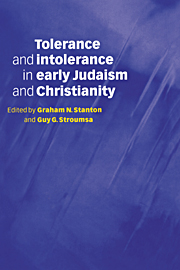Book contents
- Frontmatter
- Contents
- List of contributors
- List of abbreviations
- Introduction
- 1 Intolerance and martyrdom: from Socrates to Rabbi ‘Aqiva
- 2 The other in 1 and 2 Maccabees
- 3 The pursuit of the millennium in early Judaism
- 4 Conservative revolution? The intolerant innovations of Qumran
- 5 Who was considered an apostate in the Jewish Diaspora?
- 6 Why did Paul persecute the church?
- 7 Paul and the limits of tolerance
- 8 Philo's views on paganism
- 9 Coexisting with the enemy: Jews and pagans in the Mishnah
- 10 Tertullian on idolatry and the limits of tolerance
- 11 The threefold Christian anti-Judaism
- 12 The intertextual polemic of the Markan vineyard parable
- 13 Jews and Jewish Christians in the land of Israel at the time of the Bar Kochba war, with special reference to the Apocalypse of Peter
- 14 The Nazoreans: living at the boundary of Judaism and Christianity
- 15 Justin Martyr's Dialogue with Trypho: group boundaries, ‘proselytes’ and ‘God-fearers’
- 16 Accusations of Jewish persecution in early Christian sources, with particular reference to Justin Martyr and the Martyrdom of Polycarp
- 17 Early Christians on synagogue prayer and imprecation
- 18 Messianism, Torah and early Christian tradition
- 19 Jewish and Christian public ethics in the early Roman Empire
- Postscript: the future of intolerance
- General bibliography
- Index
7 - Paul and the limits of tolerance
Published online by Cambridge University Press: 08 March 2010
- Frontmatter
- Contents
- List of contributors
- List of abbreviations
- Introduction
- 1 Intolerance and martyrdom: from Socrates to Rabbi ‘Aqiva
- 2 The other in 1 and 2 Maccabees
- 3 The pursuit of the millennium in early Judaism
- 4 Conservative revolution? The intolerant innovations of Qumran
- 5 Who was considered an apostate in the Jewish Diaspora?
- 6 Why did Paul persecute the church?
- 7 Paul and the limits of tolerance
- 8 Philo's views on paganism
- 9 Coexisting with the enemy: Jews and pagans in the Mishnah
- 10 Tertullian on idolatry and the limits of tolerance
- 11 The threefold Christian anti-Judaism
- 12 The intertextual polemic of the Markan vineyard parable
- 13 Jews and Jewish Christians in the land of Israel at the time of the Bar Kochba war, with special reference to the Apocalypse of Peter
- 14 The Nazoreans: living at the boundary of Judaism and Christianity
- 15 Justin Martyr's Dialogue with Trypho: group boundaries, ‘proselytes’ and ‘God-fearers’
- 16 Accusations of Jewish persecution in early Christian sources, with particular reference to Justin Martyr and the Martyrdom of Polycarp
- 17 Early Christians on synagogue prayer and imprecation
- 18 Messianism, Torah and early Christian tradition
- 19 Jewish and Christian public ethics in the early Roman Empire
- Postscript: the future of intolerance
- General bibliography
- Index
Summary
INTRODUCTION
In the popular mind of Western European liberalism, Paul the Christian apostle is often regarded as an intolerant religious bigot, in contrast to Jesus who is seen as a figure of tolerance and love. This tendency to polarize Jesus and Paul and to play one off against the other is widespread. Its roots lie in various directions. Perhaps one of the most significant lies in the tendency since the Enlightenment to disparage institutional religion because of the limits religion is believed to set on personal freedom. Once Paul becomes identified as the founder of the Christian religion, a wedge is driven between Paul and Jesus in a way that preserves Jesus as the model teacher of universal love and demonizes Paul as the source of the corruption of the original ideal. Thus, if we may generalize further for a moment, we might say that whereas the Reformation drove a wedge between Scripture and church tradition, the Enlightenment shifted the wedge back a stage and drove it into Scripture itself: in this case, between Jesus and Paul. What results is another myth of the Fall, from Jesus the charismatic Galilean teacher of the fatherhood of God and brotherhood of man to Paul the founder of institutional Christianity. And, except within the Lutheran and Reformed traditions of the Christian church, Paul's reputation has suffered ever since.
What I am trying to signal at the outset, therefore, is the importance of attending to the hermeneutical dimension of our theme.
- Type
- Chapter
- Information
- Tolerance and Intolerance in Early Judaism and Christianity , pp. 121 - 134Publisher: Cambridge University PressPrint publication year: 1998
- 1
- Cited by



